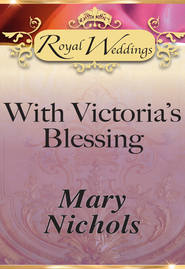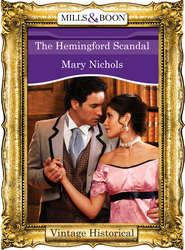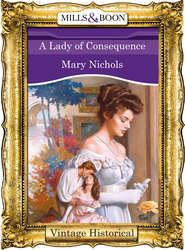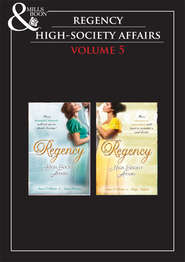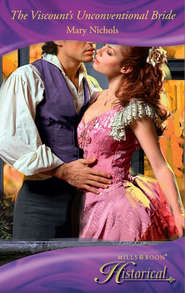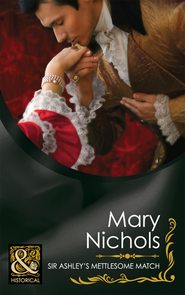По всем вопросам обращайтесь на: info@litportal.ru
(©) 2003-2024.
✖
A Desirable Husband
Настройки чтения
Размер шрифта
Высота строк
Поля
Chapter Nine
Chapter Ten
Chapter Eleven
Epilogue
Chapter One
March 1850
‘Are we nearly there?’ Esme turned from watching the countryside flying past the carriage window at a speed that would have frightened her had she been a young lady given to attacks of the vapours, which she certainly was not.
It was not her first ride in a train because she had travelled by this means the short distance from her home in Luffenham to Leicester to visit her married sister, Lucy, but that went at the pace of a snail. This was the first time she had undertaken such a long journey, and without her parents, too. Lucy had intended to accompany her, but five-year-old Harry had gone down with a cold and she would not leave him. So here she was, being escorted by her brother-in-law, who had business in town, and Miss Bannister, her old governess, who was going to act as companion and maid.
‘Not long now,’ Myles told her. ‘Are you tired?’
‘Not especially, I’m simply impatient to arrive.’ Papa had said he could not give her a Season—at least, not one befitting the daughter of the Earl of Luffenham—and she would have to take her chances on finding a husband among the local gentry, which would be very nearly impossible. She knew them all and there wasn’t one she liked well enough to want to spend the rest of her life with. The whole family talked about it, arguing to and fro as if they were talking about what to do with a problem servant. Both Lucinda and Rosemary had had come-out seasons and it didn’t seem fair that Esme should be deprived of one, for how else could she find a suitable husband? In the end, Rosemary, who was married to Rowan, Viscount Trent, and lived in a smart mansion in Kensington, had persuaded her husband to provide the wherewithal. Esme could not wait to see what social occasions had been arranged for her.
At nineteen, the youngest of the Earl of Luffenham’s three daughters, Esme was as excited as a child. With her flawless skin, rosy cheeks and big blue eyes, she looked younger than her years—a state of affairs she was anxious to correct. She was a young lady, a marriageable young lady, and she wished everyone would not treat her like a schoolgirl. Mama and Papa and Lucy had spent the whole of the day before giving her advice on how to behave. ‘Do this. Don’t do that. Remember you are a lady. Be courteous and friendly, but do not allow any of the gentlemen to whom you are introduced to take liberties.’ She wasn’t quite sure what they meant by liberties; she supposed kissing her would be one. She wondered what it would be like to be kissed by a man, but she hadn’t dared ask.
The journey had begun very early when they boarded the local train at Luffenham Halt to take them to Peterborough, where they changed on to the London train. It was all made easy for them because Myles was someone important in the railway world; porters and guards and everyone working on the railway, fell over themselves to ease his passage. But even so, sitting in a closed carriage for five hours was about as much as she could bear.
‘Another few minutes,’ he said. ‘We are slowing down already.’
She turned her attention back to the window and realised they had left the countryside behind and there were smoke-begrimed buildings on either side of the line. A minute or two later they drew into the Maiden Lane terminus and the platform came into view with people standing about, perhaps to meet others coming off the train, perhaps to board it for its return journey. Porters scurried here and there, carrying luggage, mysterious parcels, boxes of cabbages and crates of squawking chickens. A dozen empty milk churns stood ready to be sent back whence they came, no doubt to be returned full the next morning.
They stopped in a hiss of steam and the door of their carriage was opened by a porter. Myles stepped down, then turned to help her. She remembered just in time that she was supposed to be a decorous young lady and resisted the temptation to jump down on to the platform and allowed him to hand her down. Miss Bannister followed while he was giving instructions to the porter about the delivery of their luggage.
Esme felt firm ground beneath her feet; she was here at last, in the great metropolis. The excitement bubbling up in her was hard to contain, but overexuberance was one of the things Mama had warned her against, so she walked sedately beside Myles as they left the station and he hailed a cab to take them to Kensington. Familiar only with Leicester and Peterborough, the two towns nearest her home, the city seemed never ending: warehouses, shops, poky little houses and grand mansions in juxtaposition lined their route, and then a long wide avenue running alongside a park.
‘That’s Green Park,’ Myles told her. ‘Buckingham Palace is on the far side of it. We’ll come to Hyde Park soon. That’s where the Exhibition is going to be held next year.’ He leaned forward and pointed. ‘That’s the Duke of Wellington’s house.’
‘Shall I meet him?’
‘I don’t know. You might.’
‘But he is your friend?’
‘He is certainly an acquaintance, I would not be so presumptuous as to claim him for a friend.’
‘Shall I meet Prince Albert? Will he be present when I make my curtsy?’
‘Goodness, child, I don’t know.’
‘I am not a child, Myles. You sound just like Banny.’
He grinned ruefully at Miss Bannister while addressing Esme. ‘Then I beg your pardon. I shall remember in future to address you as my lady.’
‘Now you are being silly.’
Nothing could repress her for long and she was soon smiling again. A few minutes more and the cab driver turned into a wide street lined with imposing town villas and pulled up outside one of them. ‘Trent House,’ he announced.
Myles got out, handed Esme down and then her companion. He was always courteous and polite to Miss Bannister and treated her like a lady, for which he received her undying support.
Esme was standing uncertainly, looking about her, when the front door of the nearest house was opened and her sister, in a dove-grey dress and white cap, stood waiting to greet her. Esme started to run to meet her, but remembered in time that running was not ladylike and walked to the door.
‘Here at last.’ Rosemary offered her cheek to be kissed. ‘Did you have a good journey?’
‘Yes, very good, but I’m so glad to be here.’
‘You are very welcome, sister dear.’ And to Myles, offering her hand, ‘Myles, welcome. Come along in. I’ll take you to your rooms, then when you have settled in, we shall have some refreshments and you shall tell me all the news from home.’
Ignoring Miss Bannister, she led the way into an imposing entrance hall and up a flight of stairs. ‘The drawing room,’ she said, waving at a closed door. ‘And that’s the dining room. The door farther along is the small parlour where we sit when we are alone. That’s where I shall be, so come there when you are ready.’ On she went up a second flight of stairs. ‘Bedrooms on this floor,’ she said, flinging open a door. ‘This one is yours, Esme. I have put Miss Bannister next door, for your convenience. Myles, a room has been prepared for you at the far end of the corridor.’ She pointed at a farther flight of stairs. ‘Nursery suite and servants’ quarters up there, though they have their own staircase. That’s it, except for the ground floor, which contains anterooms, a large room we use for dancing, soirées and suchlike, the library and Rowan’s study. I’ll show you those later.’
Miss Bannister and Myles left them and Rosemary followed Esme into her room and sat on the end of the bed to watch as her sister removed her gloves, cloak and bonnet to reveal a tiered skirt in a soft blue wool. It was not new. Nothing she had was brand-new. ‘Esme, did you have to wear that dress?’
Esme smoothed her hands over her waist. ‘What’s wrong with it? Mama said it was perfectly adequate for travelling.’
‘It’s years old. I remember you having that when I was still at home.’ She stopped speaking to answer a knock at the door. Two footmen had arrived with Esme’s trunk. They were waved inside and told to put it on the floor at the foot of the bed. They had no sooner gone than Rosemary had it open and was pulling out the contents. ‘Esme, I could swear this was Lucy’s jacket. And this skirt.’ She delved deeper into it. ‘And this gown…’
‘So they are—Mama said no one would ever know.’
‘Haven’t you brought any clothes of your own?’
‘Not many,’ Esme confessed. ‘They are all so old and some of them are too short for a young lady and Lucy said I could have these. She has grown a little plumper since she had Vicky and they are the very best materials. We hardly had to alter anything, except to shorten them. Lucy is inches taller than I am.’
‘Whatever was Mama thinking of, to send you with nothing but hand-me-downs? You’ll never find a husband that way.’
‘No one knows they are hand-me-downs.’
‘Myles knows.’
‘Of course he does, but he’s family, and Lucy asked him if he thought it was all right for me to have them and he said they were her clothes and she could give them to whomever she pleased.’
‘He would.’ There was a deal of meaning in those two words and conveyed perfectly what Rosemary thought of her brother-in-law. He was an upstart, a nobody, for all he was Lord Moor-croft’s heir; it was a new peerage and meant nothing at all, except that the working classes were aspiring to become nobility, which they never could do. They did not have the breeding. She tolerated him, even managed to be polite and treat him like an equal, but that was for Lucy’s sake, not his. ‘I can’t take you out and about unless you are dressed appropriately. Whatever will people think of me?’
‘I shouldn’t think they will think anything of it.’ Esme had forgotten how repressing Rosie could be. Nothing and nobody was good enough; even her poor husband was bullied into conforming to her ways.
‘Nevertheless, you shall have a new wardrobe. Thank goodness the Season hasn’t started yet and there will be plenty of choice in the shops and dressmakers with little enough to do.’
‘I am sure Papa cannot afford it. He has been lecturing us for years about not being extravagant and it’s got worse since he lost money investing in the Eastern Counties railway.’
‘More fool him for doing it. No doubt he listened to Myles.’
‘It wasn’t Myles’s fault, he advised against it. I believe it was Viscount Gorridge, though his lordship cannot have taken his own advice because he is richer than ever.’
‘Well, whatever it was, you are going to have new clothes. Rowan will pay. He always gives me whatever I ask for.’






